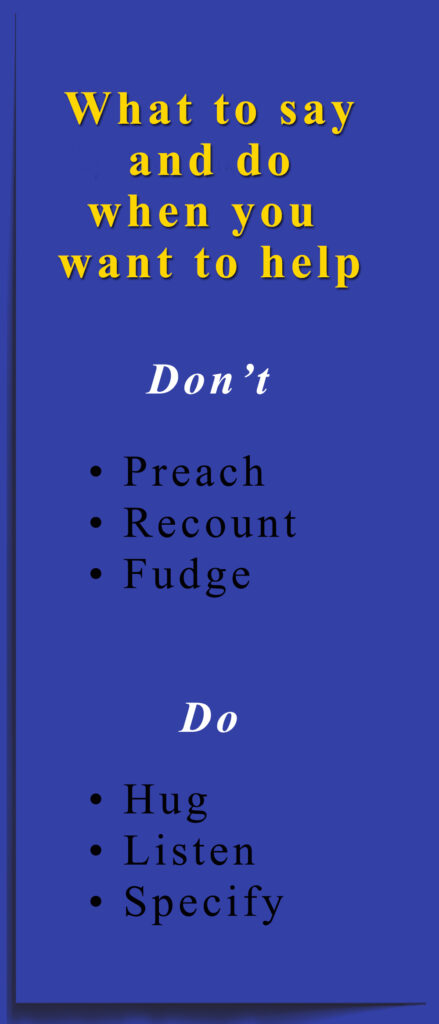Being on the receiving end of extravagant goodwill, I’d like to share my perspective on what works and doesn’t work when reaching out to someone in pain.
When a friend or loved one is in anguish, we all want him or her to feel better. But how should we do that? Could we say the wrong word or do the wrong thing and make things worse? It’s possible. So, here’s my list of dos and don’ts when offering support.
What not to say or do
I recommend staying clear of sentiments that preach, recount tragedies in your own family, or fudge.
1. Preach. Some think it’s comforting to say things like “It’s God’s will” or “It’s part of God’s plan” or “If you die, you’ll be in a better place.” I doubt that view would be comforting to even the most devoted zealots. As for the irreligious, the suggestion is, to be kind, bewildering. What loving father would wish pain for his children? And although this will be difficult for converts to understand, nonbelievers have little interest in life after death. For them, there is only one life, and it takes place on earth.
Incidentally, a 2021 Pew Research poll showed that sixty-three percent of Americans identify as Christians, a fifteen-point drop since 2007. In contrast, roughly three-in-ten American adults are now religiously unaffiliated, and the trend is gathering speed. All that to say, some people are not likely to be moved by religious appeals.
But let’s imagine you’re speaking to those who are believers. Even for them, such sentiments could be confusing, compelling them to ask, “Does God not love me? Am I being punished? Am I not worthy of his love?” Such questions of faith can hinder, even arrest recovery.
2. Recount. These are two killer phrases: “I know exactly how you feel,” and “You remind me of something my uncle/mother/friend or I went through.” Here’s the point: If you want to comfort someone, don’t make it about you. It’s not about you; it’s about your friend and his or her distress.
Such people may think they do know exactly how others feel, but they’re mistaken. No one does. Battling cancer has caused me to look inward, right down to my core. That’s a very private place, and no one knows for sure what abides there. Half the time, I’m clueless. So, keep your remembrances tucked away. They’re not helpful.
3. Fudge. First a definition. To “fudge” is to act dishonestly in a subtle way. You might wonder how a person would fudge when their intention is to help others. They do it by saying, “If you need anything, give me a call.” They’re not really stepping up. In fact, they’re forcing the person in need to take responsibility by calling.
Would they really be ready to do anything? I’ve always thought it would be uplifting to have dancing girls pay me a visit. Would they be inclined to organize that? Okay, that’s a silly example. Let’s try something more mundane yet painfully real. Would they be keen on sanitizing my toilet bowl with bleach? Would they be willing to wash the bedsheets I wet in the night? Probably not—at least not without a grimace.
In brief, fudging is pretending to care without doing anything.
The tactic puts me in a tough spot. What if I bite and ask for help on something they consider demeaning? Could I risk losing a friend? I’m already overrun by turmoil. Do I really want to deal with the chance of insulting a pal? The answer is “no.”
Mature friends don’t fudge. They own the responsibility. (More about that in the next section.)

What to say or do
I recommend hug, listen, and specify.
1. Hug. Words can be tricky. It’s hard to pinpoint what will work. But a warm hug from a dear friend is clear. It says, “I love you. I’m sorry you’re going through this. And I want the best for you.”
Most of us are conditioned to respond to an embrace. If we were lucky, our parents taught us the magic. When we were endearing, troubled, even naughty, a parental hug reassured us we were still loved. We know the feeling; we long for the feeling.
It’s true some are squeamish about hugs, which needs to be respected. If you’re not sure, ask, “Could you use a hug?” or, if you’re really uncertain, “Do you do hugs?”
For the record, I’m a huggy guy and always grateful for a warm embrace.
2. Listen. Again, we often don’t know the right thing to say. After all, what is right for one person may be unsettling for another. The easy solution is to ask, “Do you want to talk about it?”
Personally, I do want to talk about it. When I articulate what I’m feeling and thinking, it clarifies the crisis. I begin by looking inward—examining the nuances of my emotions. Then slowly, cautiously I describe what I sense. Often something astonishing happens. Once the words are out, I can say, “Yes, that’s it, that’s how I feel.” And the insight can be a great relief.
Unfortunately, some don’t know how to shut the hell up. They feel driven to plunge their fingers into my gut and tell me how I really feel. They may say, “Just lean on Jesus” or “Don’t be pessimistic” or “Stop sulking”—or whining or grieving.
But those who are emotionally intelligent know how powerful a smile or a nod or a simply “uh-huh” can be. When they are unobtrusive—when they just sit back and let the person in pain do the work—something incredible happens. At the end of the session, the one suffering may say, “Thank you. That was a great discussion”—when, in reality, it was a cathartic monologue, all set in motion by a gentle listener.
3. Specify. Earlier I discounted the ploy, “Call me if you need anything.” I called it fudging. In contrast, I recommend being precise. Specify what you can do. Or just simply do it without fanfare.
For me, loving friends and family members have dropped by unannounced with muffins, nectarines, cherries, and an assortment of treats from the sixth major food group—chocolate. It required no coaching; they just did it.
Others have offered a specific service.
Josie said, “Let me drive you to the Medical Center in Seattle.”
With a kind heart, Elaine said, “Let’s go for a walk.”
Bob said, “Let me install a handrail to ease the step down from your porch.”
My musical kindred spirit Debi said, “I’d like to come over and jam with you.”
And most intimately, Alan said, “I want to make sure your catheter is spotless. I’m coming over to clean your dipstick.”
In all cases, I wholeheartedly accepted their gifts.
Note that what they gave was their most precious resource—their time. You can’t ask for more than that.
Such precise gifts took all the weight off me. I never had to figure out nor risk asking how they could help. All I had to do was sit, smile, and choke down the urge to sob out of sheer gratitude.
In summary, here are the rules: When your approach is about you—your philosophy, your religion, your recollection of similar ordeals—you’re on the wrong track. When it’s about the person in pain—his or her thoughts, feelings, and needs—you’re on safe ground. Learn to listen, to be present, to offer a precise way you can lend a helping hand. If you do that, you will be a catalyst for healing.


